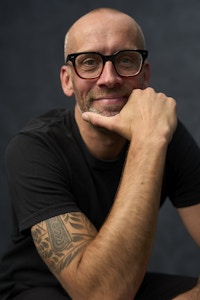
I was chatting with a potential client last week, and things weren't working for them as well as they could be. They had a good product that delivered for customers, but their business performance wasn't where they wanted it to be. They were doing some advertising to get more people to know them. But it all looked the same as companies much bigger, who spent considerably more, and their story wasn't garnering attention. If we're being honest, which I was, it wasn't really being told.
I appreciate that many things could change a company's prospects, but I focused on this in my conversation and for this story.
If things aren't working and you want better outcomes, change your story.
Stories matter. We humans are wired for stories. We crave, trust, and, most importantly, buy them.
Success isn't determined solely by your product, service, or price. It's shaped by the narrative you build around your brand. Some products are decidedly average, but the story is fan-bloody-tastic, and folks buy them. Likewise, a good product may have an average story and not sell as well as it should.
If you want to shift your future, start with your story.
Growing up in sunny Scotland, the first business I remember telling a powerful story about their beverage, made in Scotland from girders, which was Barr's Irn-Bru. Yes, they played on our plucky nation's sense of pride and took it to the big (primarily American) global drinks brands, but they did it with irreverence, fun, and the perfect blend of cheek and charm that Scots have. Their story was one you wanted to be a part of. You wanted to watch it again and again. And you wanted to buy their product, making them the biggest brand in the market.
I also remember fondly Gregor Fisher, from Rab C. Nesbitt, starring in Hamlet's 'A mild cigar' ads from the late 80s to the early 90s. Even though I was too young to smoke and not in the target market, the story stayed with me, and I know it worked for many cigar smokers at the time.
How many stories from brands stay with you these days?
Due to the monumental shift happening as I was drinking and smoking (not Hamlet's) my way through a business and marketing degree, Apple's story was influential on me at the time. In 1997, close to bankruptcy. The company shifted from tech specs to storytelling, introducing the "Think Different" campaign. They talked about creativity, innovation, and changing the world. They didn't just sell tech products; they invited customers into a story about identity, vision, and aspiration. And you all know what happened to its performance from here. Yes, they had great products, but their story supercharged its appeal and pricing power.
Dove, a brand I had the pleasure of working with for years, is another example of a shift in narrative that creates a change in performance without much change to what was inside the packaging. By going against the beauty industry's view of beauty and speaking directly to real women and their real beauty, they were able to shift the view and conversation on beauty itself and reposition the brand as a champion for real women who bought the category, turning a brand that was struggling into a global powerhouse.
When I first moved to New Zealand in 2008, ASB Bank's Goldstein was an incredible body of work on the power of great storytelling. I won't bang on about it too much. Still, the power of a character from the US, selling the merits of a New Zealand bank, its people, and its offering through the American view of New Zealand's cultural lens and common traits, was a marketing masterstroke that gave birth to years of compelling storytelling and consistent market share growth.
Another excellent example of the power of a narrative shift is Airbnb.
Airbnb initially struggled, being viewed as just another rental service competing with hotels. Their breakthrough came when they shifted their narrative from "affordable accommodation" to "belonging anywhere." With the change in the story, a change in the medium followed, going from a focus on performance-based digital and ROAS to premium broadcast channels, powerful storytelling, and brand health that turned Airbnb from an unemotional and transactional service into an experience of genuine human connection and belonging, resulting in rapid global growth and industry disruption.
Of course, there are many excellent examples of companies changing their fortunes by telling a different story. I could go on for hours.
I'll leave you with one of my favourites. Old Spice was an aging brand associated with older generations and declining market share. With its iconic "The Man Your Man Could Smell Like" campaign, Old Spice dramatically rewrote its narrative, shifting from outdated masculinity to playful irreverence.
Their change in story also changed the primary audience for their story. Old Spice's breakthrough wasn't just about revitalising the brand for men; it was strategically shifting its story to appeal directly to women, often the primary purchasers of men's grooming products.
Their narrative cleverly positioned Old Spice as the brand that women would want their partners to use, humorously suggesting it could turn an everyday man into the decidedly handsome and charismatic Isaiah Mustafa, opening a powerful new path for growth.
These examples prove something significant: the stories we tell shape our success far more than most realise.
If things aren't working as you want, you can pause and reconsider your narrative.
It's worth asking yourself, are you telling the right story?
Is it being heard by the right people?
Is it being told in the best medium to amplify its impact?
Your business's future success might depend less on changing your product or service and more on changing the story you tell about it.
After all, humans don't just buy products; we buy stories that speak to us, move us, and make us feel something. The power of your story can be the difference maker in getting potential customers to choose you over the competition. It could also be the reason people are willing to pay more.
